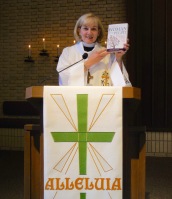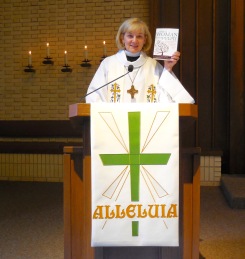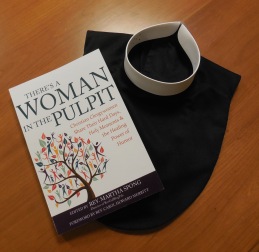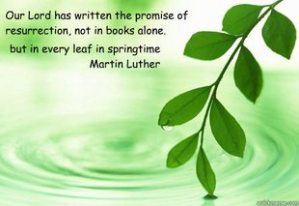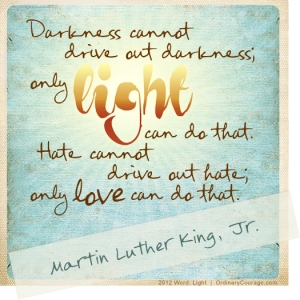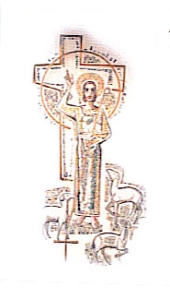Sermon preached at Faith Lutheran Church, Janesville, WI on August 4, 2013 by Pastor Anne Andert
“We Ain’t Poor”
Most of you have heard me talk about my wild & crazy road trip up to northern Manitoba, Canada. I was going to teach Vacation Bible School in a Cree village far away from any other civilization. The village of God’s Lake Narrows is 200 miles from the nearest road, and the only way in is by canoe, boat, or a small plane.
The first time I went there with a small team of women from the congregation where I worshipped. We were the first white people that had ever been allowed to enter the village and gather the children together for Bible School. While we were there, we stayed with a retired Cree couple who were Christian missionaries to the people in the village.
Alan and Elsie Sinclair were poor by many standards. They lived in a small, drafty broken down trailer home. They wore old, patched hand-me-down clothing. Yet they graciously and generously shared with us from what they had.
In the evening as we sat around their modest kitchen table we guessed at what we were eating. Since one of the women on our team had a husband who hunted, she correctly guessed venison (deer & moose), bear, and several kinds of fish on different evenings. The bread was all made from scratch and topped with homemade jam from wild berries gathered in the surrounding woods.
Our drinking and bathing water came directly from the lake, and we took turns making the long walk with the buckets down the hill and back up again.
In the evening we joined Alan and Elsie as they slowly lowered their elderly bodies to their knees so that they landed facing their old, worn sofa. They helped one another down to the rag rug. Then when they were finished praying in their beautiful melodic Cree language – followed by English for our benefit, they would pull one another back up to their feet again all the while laughing good naturedly at their aging bodies.
Their hearts and prayers were filled with sincere gratitude for God’s generous blessings. Our eyes were filled with tears as we considered the wealth of our own homes, congregation, and communities. We recognized the seemingly insatiable appetite for money and the things that money can buy that is so prevalent in our world which seemed so very far away from that wilderness.
Today’s gospel reads, And Jesus said to them, “Take care! Be on guard against all kinds of greed; for one’s life does not consist in the abundance of possessions.”
Often when churches are talking about money, it’s because they don’t have enough of it. Frequently when people talk about money, it’s because they would like to have more of it. That’s the opposite of why the Bible usually talks about money. When the Bible talks about money, it’s usually because somebody has or wants too much of it. That’s the case in our Gospel lesson today. (1)
And Jesus said to them, “Take care! Be on guard against all kinds of greed; for one’s life does not consist in the abundance of possessions…. And God said to him, ‘You fool! This very night your life is being demanded of you. And the things that you have prepared, whose will they be?’ So it is with those who store up treasures for themselves but are not rich toward God.”
I won’t ask you to raise your hands, but I would guess that many of us have had occasion to be admitted to the hospital for surgery or an invasive test.
First you leave your purse or your wallet and your jewelry and other personal things at home… items that we nearly always carry with us all. After registering at the hospital, you hand over your insurance card, your ID, and your phone to your spouse, child, friend or whomever has accompanied you to the hospital. Then you trade in your clothes for one of those really fashionable hospital gowns. Finally, you relinquish even your consciousness to the drug-induced sleep of anesthesia.
When we surrender so much of that which identifies us, it is a good reminder that all any of us really has is God. We surround ourselves with the protection of status, or job, or belongings, or a bank account; and these are all very good. But at some point, age or misfortune or tragedy can strip them away. Sometimes quickly, and sometimes bit by bit, and we recognize that, finally, it’s just God and us. (2)
A few years ago I heard a report on public radio. A survey had been taken to discover if money can bring happiness and if more money brought more happiness. The finding of the researchers was that money does bring happiness to a point. They found that, on average, throughout the U.S. people who were earning less than $50K per year were less happy than those earning more.
However, those earning $75K or $100K or $200K a year were not any happier than those earning $50K. A sufficient amount of money does bring happiness when essential needs are met, but more money does not bring more happiness. (3)
It has long been known that generally people with lower income give a higher percentage of their income to charitable causes than people with higher income. More recently it has been learned that the groups also give to different causes.
Lower income people are more likely to support food shelves, homeless shelters, places like ECHO – those agencies directly supporting the needy.
Higher income people are more likely to support colleges, the humanities, arts, music and drama programs.
The theory is that those who have lived, or live, closer to poverty are more empathetic to it, and have more personal contact with those living in it. Those with higher incomes have less empathy because they do not see poverty on a daily basis and are not regularly confronted with those needs on a first hand basis.
There are many things that money can do for us. It can give us a comfortable home to live in, a reliable car to drive, access to education, health care, and all the physical necessities of life. Please don’t hear this as a sermon against money. It isn’t.
It is when the desire to have more becomes the driving force in our life, when it dominates our thoughts, and causes us to neglect our responsibilities to our family and to God; then money becomes not only a problem – it becomes our god. We worship money and not God. And there are many people in our society who walk very close to that line that separates the worshipers of God and the worshipers of money. The love of money can destroy our soul. (4)
Awhile ago someone told me a true story about a social worker in poverty-stricken Appalachia. I had Sara type part of it in the bulletin today so you could take it home if you’d like because I thought it was so good… Worth re-reading and pondering. Listen to the social worker’s recounting of her story:
“The Sheldons were a large family in severe financial distress after a series of misfortunes. The help they received was not adequate, yet they managed their meager income with ingenuity – and without complaint.
“One fall day I visited the Sheldons in their ramshackle rented house where they lived at the edge of the woods. Despite a painful physical handicap, Mr. Sheldon had shot and butchered a bear that strayed into their yard once too often. The meat had been processed into all the big canning jars they could find or swap for. There would be meat in their diet even during the worst of the winter when their fuel costs were high.
“Mr Sheldon offered a jar of bear meat to me. I hesitated to accept it, but the giver met my unspoken resistance firmly. “Now you just have to take this. We want you to have it. We don’t have much, that’s a fact; but we ain’t poor!”
“I couldn’t resist asking, “What’s the difference?” His answer proved unforgettable.
“”When you can give something away, even when you don’t have much, then you ain’t poor. When you don’t feel easy giving something away even if you got more’n you need, then you’re poor, whether you know it or not.”
The social worker continued, “I accepted and enjoyed their gift and treasured that lesson in living. In time, I saw it as a spiritual lesson, as well. Knowing that all we have is provided by the Father, it seems ungracious to doubt that our needs will be met without our clinging to every morsel. When I feel myself resisting an urge to share what’s mine – or when I see someone sharing freely from the little he has, I remember Mr. Sheldon saying, “We ain’t poor!””
Alan and Elsie Sinclair didn’t have much, but they weren’t poor. Mr. Sheldon didn’t have much, but he was not poor, either. What about each of us? What about our congregation? 790 rolls of toilet paper so far this summer to ECHO. $1045 collected last week that will be matched by Thrivent for the ministry that ECHO does in our community. Not bad! Not bad! How else does our heavenly Father hope that each of us might reach out in love?
“When you can give something away, even when you don’t have much, then you ain’t poor. When you don’t feel easy giving something away even if you got more’n you need, then you’re poor, whether you know it or not.”
May God open our hearts to respond generously to the needs around us. And may God bless and multiply all that we offer.
Thanks be to God!
1. Brian Stoffregen, exegetical notes for Luke 12:13-21, Proper 13C – 8/5/07.
2. Betsy of RevGalBlogPals, “Preacher Party” – August 3, 2013.
3. op. cit.
4. King Duncan, “Pigs Get Slaughtered” sermon for Proper 13C.
5. From the story by Florence Ferrier, “We Ain’t Poor.”
